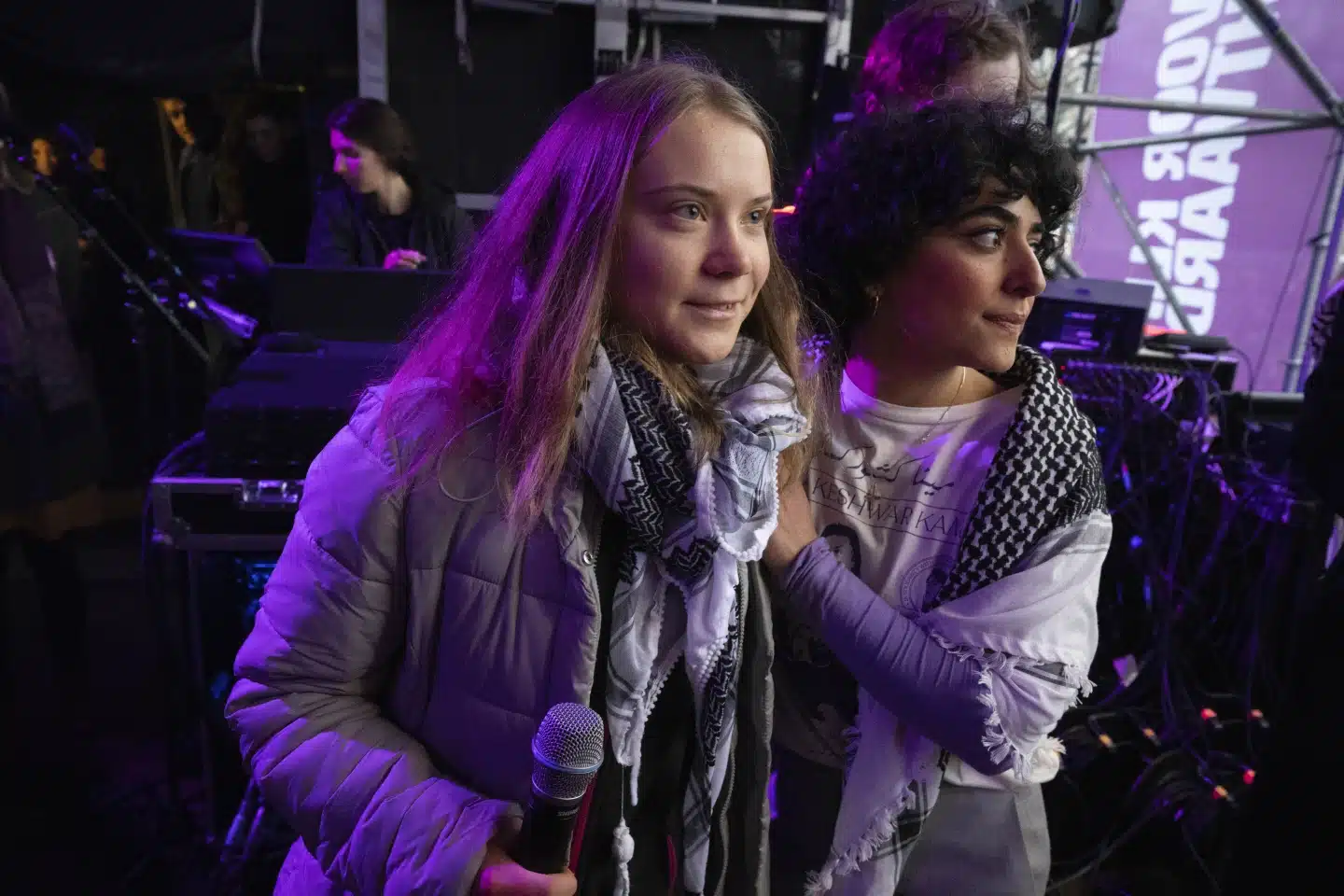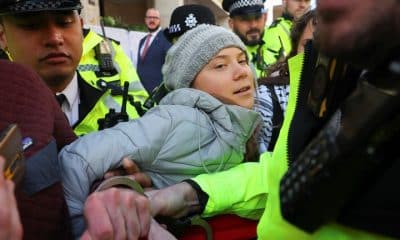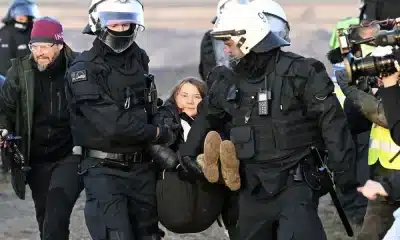Election News
Greta Thunberg Brushes Off Interruption At Massive Dutch Climate March Days Before Election

AMSTERDAM, Netherlands — A man approached Greta Thunberg, a climate activist, after she invited a Palestinian and an Afghan woman to speak during a climate demonstration in the Dutch capital, and he briefly interrupted her on stage.
Thunberg spoke in front of thousands when she brought the women on stage.
“As a climate justice movement, we must listen to the voices of those who are oppressed as well as those who fight for freedom and justice.” “Without international solidarity, there can be no climate justice,” Thunberg stated.
After the Palestinian and Afghan women finished speaking and Thunberg started her address, a man approached her and said, “I have come here for a climate demonstration, not a political view,” before being escorted off the platform.
The identity of the man took time to become obvious. He was wearing a jacket bearing the name of Water Natuurlijk, a group that has elected members to Dutch water boards.
The Afghan woman, Sahar Shirzad, told The Associated Press that Thunberg let them join her on stage.
“Basically, she gave her time to us,” she explained.
The gathering was momentarily interrupted before Thunberg entered the platform by a small group of activists at the front of the crowd waving Palestinian flags and chanting pro-Palestinian slogans.
She seemed unfazed and was subsequently seen dancing behind the stage while the band played.
Tens of thousands of people marched through the streets of Amsterdam in a major protest just 10 days before a national election, pushing for more action to combat climate change.
According to organizers, the march drew 70,000 people, making it the largest climate protest in the Netherlands’ history.
Thunberg was among those strolling around Amsterdam’s historic center.
Later, political leaders addressed the crowd assembled on a square behind the iconic Rijksmuseum, including former European Union climate director Frans Timmermans, who now leads a center-left, two-party group in the election campaign.
“We live in a time of crises resulting from political decisions made.” It must be done, and it can be done differently,” stated Climate Crisis Coalition organizers.
Greta Thunberg Brushes Off Interruption At Massive Dutch Climate March Days Before Election
While the Fridays for Future youth movement was represented in the coalition, protestors of all ages were present, including a huge force of medics in white coats carrying a banner that read: “Climate crisis = health crisis.”
“I work as a paediatrician.” “I’m here to advocate for children’s rights,” said Laura Sonneveld. “Children are the first to be affected by climate change.”
Climate change is a crucial policy issue for political parties competing in the Nov. 22 general election.
“The time has come for us to protest government decisions,” said Margje Weijs, a Spanish teacher and youth coach. “I hope this influences the election.”
SOURCE – (AP)
Election News
Kamala Harris Polls Better Than Joe Biden with Voters of Color and Young People

Kamala Harris appears to be more appealing to voters of colour and younger voters than Joe Biden was before dropping out of the presidential run. Harris has the potential to acquire greater support from these groups in her upcoming election against Donald Trump, as seen by 2020 outcomes.
Check out our freshly published CNN/SSRS poll. Harris has a 78% to 15% edge over Trump among black voters. In CNN polling data from April and June, Biden led by a narrower 70% to 23% among these same voters (the poll interviewed the same respondents again).
This is also true for Hispanic voters, albeit to a lesser extent. Harris has 47% to Trump’s 45%, compared to 50% for Trump and 41% for Biden among the same respondents in April and June.
Voters under the age of 35 show a similar shift. Kamala Harris currently has 47% to Trump’s 43%. In April and June, these same voters supported Trump 49% to 42% over Biden.
In some ways, none of these changes are very shocking. Biden had performed the lowest for a Democrat this century among all of these normally Democratic-leaning populations. In fact, his showing among Hispanic and Black voters was the lowest by a Democrat in more than 50 years.
Kamala Harris probably had no choice but to align with these voting blocs.
Despite the improvement, Harris’ results should leave a lot to be desired. In the final 2020 surveys, she scored at least 5 points lower than Biden among the same groups.
By the end of the 2020 campaign, Biden had an 84% to 9% lead over Trump among Black voters. Even more noteworthy is Biden’s 58%-32% lead among Hispanic voters.
Finally, even though Harris has become a meme favourite with young voters, Biden’s 60% to 31% lead over Trump by the end of the 2020 campaign is significantly larger than Harris’ current position.
(It’s worth noting that polling at this time in the 2020 campaign was similar to polling in the end.)
This may appear to be bad news for the Harris campaign, and it certainly is. Harris is unlikely to defeat the former president unless his performance in these areas improves.
The good news for Kamala Harris is that she’s gaining progress with this group in comparison to Biden’s performance earlier this year.
As Harris continues to establish herself outside of her role as Biden’s vice president, there is a good chance she will build out her own political identity, which may appeal to voters of colour and young people.
The fact that Harris outperforms Biden among voters of colour gives her the ability to open up more avenues in the Electoral College.
Biden’s route to 270 electoral votes seems restricted. He would need to dominate the northern battleground states of Michigan, Pennsylvania, Wisconsin, and Nebraska’s 2nd Congressional District. His polling numbers in the Sun Belt states of Arizona, Georgia, Nevada, and North Carolina were low.
If Biden had won the northern battleground states and the other Democratic-leaning states (excluding the aforementioned Sun Belt states), he would have received the 270 electoral votes required to win.
Biden underperformed in Sun Belt states because of their high proportion of Black and Hispanic voters. Kamala Harris may be able to reopen the door to new electoral paths if he performs better with those demographics.
If Kamala Harris wins all four Sun Belt battlegrounds indicated above, she will not need to carry Michigan, Pennsylvania, or Wisconsin.
Perhaps more plausible, Kamala Harris may reach 270 electoral votes by winning a combination of northern battlegrounds and Sun Belt swing states.
The bottom line is that the latest CNN poll gives the Kamala Harris campaign some hope. It’s not that Trump isn’t popular, or that Harris won’t have a difficult campaign.
Rather, Kamala Harris now has a number of avenues to success, whereas Biden’s options appeared to be narrowing rapidly.
Source: CNN
Election News
As Harris Moves To Secure The Democratic Nomination, Misinformation Follows Soon After Online

Within minutes of President Joe Biden endorsing Vice President Kamala Harris to succeed him on the Democratic Party’s ticket on Sunday, the internet erupted with lies, distorted photographs, and other false allegations about Harris.
Some fans of former President Donald Trump, the Republican contender for the November election, even claimed Biden was the victim of a coup.
Meanwhile, a flurry of slickly crafted pro-Harris videos soon spread on social media as her supporters attempted to capitalize on the situation.
The venom and counter-punches are a likely preview of the remaining three months of the presidential race when a fierce battle to mold and destroy Harris’ image will take place at a time when social media companies have reduced disinformation controls.
“As Kamala Harris becomes more likely to be the Democratic Party’s presumptive presidential nominee and gains more public attention, the amount of disinformation and misleading rhetoric will increase exponentially,” Erik Nisbet, a professor at Northwestern University’s School of Communication, told CNN.

Harris | CNN
As Harris Moves To Secure The Democratic Nomination, Misinformation Follows Soon After Online
On X, owner Elon Musk fueled an antisemitic conspiracy theory by responding to a photo of Harris with Alexander Soros, son of billionaire megadonor George Soros, by implying that Harris was a “puppet” of the family. Musk embraced Trump this month, sharing pro-Trump content with almost 190 million followers.
Photoshopped photographs of Harris have also surfaced. One photo of Harris smiling with her husband was altered to make it appear like the vice president was posing with Jeffrey Epstein, the deceased financier and accused sex trafficker.
In the hours following Biden’s revelation, the hashtag “She’s Indian” trended on X, with some users spreading a false rumor about Harris being “not Black” (Harris’ mother was born in India and her father in Jamaica).
PeakMetrics, a social media analytics firm, examined approximately 175,000 posts on X between 6 and 7 p.m. ET on Sunday that addressed Harris about Biden’s statement and discovered that 8.3% of the postings used “racialized” language, while 4.5% used “sexualized” language.
Biden’s likeness was also utilized following his announcement, which was made via a social media post rather than a broadcast address. A bogus, expletive-laden video purporting to show Biden announcing his decision to withdraw from the race began circulating on X.
PBS News, whose logo appeared in the video, issued a statement labeling it a ” deep fake,” adding, “PBS News did not authorize the use of this video, and we do not condone altering news video or audio in any way that could mislead the audience.”
Pro-Harris videos flooded TikTok, with many citing a coconut joke that has become synonymous with support for her candidacy. (In 2023, Harris delivered a speech on expanding chances for Hispanic Americans that featured a statement attributed to her mother on understanding the context of young people’s lives: “You think you just fell out of a coconut tree?”) One TikTok video, a compilation of Harris memes, had almost 712,000 likes and 73,000 shares.
Harris’ crew has also embraced a popular post by British pop singer Charli XCX, who referred to Harris as a “brat,” a phrase encompassing women’s and LGBTQ+ empowerment.
As Harris Moves To Secure The Democratic Nomination, Misinformation Follows Soon After Online
Russian official media also quickly responded to Biden’s decision to withdraw. Sputnik, one of several pro-Kremlin mouthpieces, wrongly claimed in a tweet that Ukrainian President Volodymyr Zelensky had been a “curse” to Biden.
“I don’t think Kremlin-aligned accounts will drive conversations related to this news,” said Joseph Bodnar, a researcher who studies pro-Kremlin media for CNN. “But they’re certainly happy to boost divisive domestic narratives.”
“Imagine being a foreign disinfo/information operations actor trying to compete with the actual news this election cycle,” joked Shane Huntley, a cyber threat intelligence expert at Google, on X.
SOURCE | CNN
Politics
US President Joe Biden Dismisses Calls for Cognitive Test

In a television interview on Friday, US President Joe Biden deflected queries on his mental health in an attempt to put a stop to demands that he withdraw his reelection campaign after his dismal debate performance with former President Donald J. Trump.
Sensations of discontent among certain Democratic voters, lawmakers, and fundraisers were growing, and the one-on-one meeting with the ABC network was billed as the most important of the 81-year-old president’s lengthy career.
However, the 22-minute sit-down with ABC’s George Stephanopoulos seemed to offer little comfort as Biden continued to downplay polls and party concerns that the debate had seriously harmed his chances while blaming illness for his poor performance.
“I was feeling sick and miserable. The president stated, “I just had a really bad cold,” in his first lengthy, unscripted statement since his confrontation with Republican challenger Donald Trump last week.
The purpose of the interview was to help Biden weather the storm, but his rough voice and rambling responses immediately prompted criticism from Democrats for coming across as “out of touch.”
“I don’t think anybody’s more qualified to be president or win this race than me,” Biden responded when asked if continuing in the race would endanger Democrats’ chances of winning the presidency.
Biden was Defiant
He declined requests for a mental health evaluation, claiming that his daily tasks as president need him to take a cognitive test. I have to pass that test every day for all I do.
As the program aired, the Trump campaign jokingly stated on social media that “Biden sounds great” before declaring that the president “is in denial and in decline.”
The interview followed Biden’s sluggish and frequently nonsensical performance in the Atlanta debate against Trump, which sent shockwaves through his party and prompted demands for him to withdraw from the contest.
The Biden team has strongly refuted any notion that he could pull out and, in the final hours before the ABC interview, unveiled a rigorous campaign itinerary for the remainder of July.
The president made a strong declaration during an animated stump speech at a Madison, Wisconsin, campaign rally: “I’m staying in the race.” Donald Trump will lose to me.
Following the debate, surveys have showed a growing margin in favor of Trump, and a number of Democratic-leaning political pundits, major newspapers, and at least four members of Congress have called for Biden to resign.
Democrats turning on Biden
US media reported that House Minority Leader Hakeem Jeffries and Senate Intelligence Committee Chairman Mark Warner were arranging crisis discussions with members in the coming days.
Throughout Friday’s interview, ABC interviewer George Stephanopoulos brought up the rising Democratic demand for a discussion on selecting a new candidate and questioned Biden about his willingness to resign if he became certain he couldn’t defeat Trump.
“Well, that depends. He responded, “I might do that if the Lord Almighty comes down and tells me that.”
After the fact, Biden clarified that he had not seen the debate, saying, “I don’t think I did, no.”
He also rejected the notion that his subpar performance was an indication of a more significant medical issue.
“It was a bad episode with no signs of a major illness.” I was worn out. In terms of getting ready, I disregarded my gut feelings, and I had a terrible night,” Biden remarked.
Top White House assistant to Barack Obama, David Axelrod, who has occasionally caused trouble for the Biden administration, claimed that the interview revealed a president who is “dangerously out of touch” and expressed doubts about his suitability for office.
He led Trump by ten points at this moment four years ago (in polls). He is now six points behind, according to Axelrod’s post on X.
According to the White House, Biden will travel to Pennsylvania this weekend and then deliver a press conference during the NATO summit in Washington the following week.
-
World2 weeks ago
Former President Trump Survives Being Shot at Pennsylvania Rally
-
Tech4 weeks ago
Huawei Launches 5G-A Pioneers Program at MWC Shanghai 2024: Paving the Way for a Connected Future
-
Sports4 weeks ago
NBA Draft: Kyle Filipowski Withdraws Unexpectedly From The First Round
-
Tech4 weeks ago
ChatGPT Answers Undiscovered Questions and Outperforms Students.
-
News4 weeks ago
US Supreme Court Rejects Drug Deal that Protects the Sackler Family
-
Health4 weeks ago
US Health Agency Issues Dengue Virus Infection Warning
























